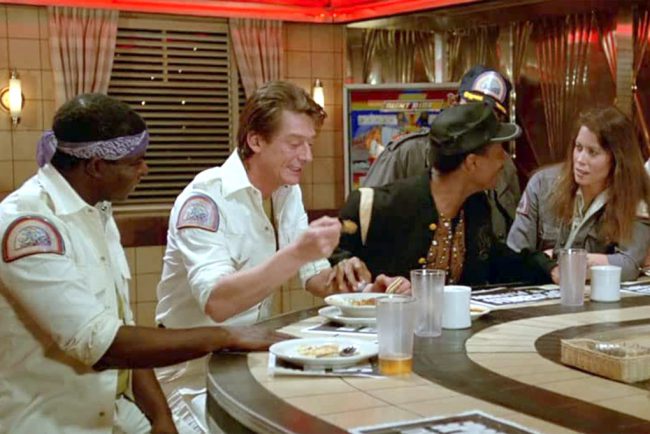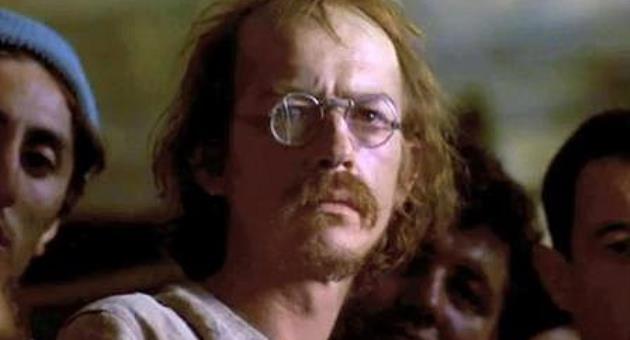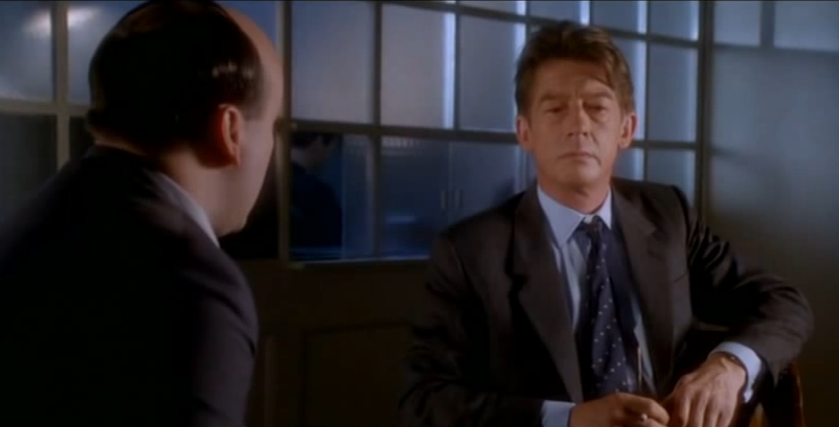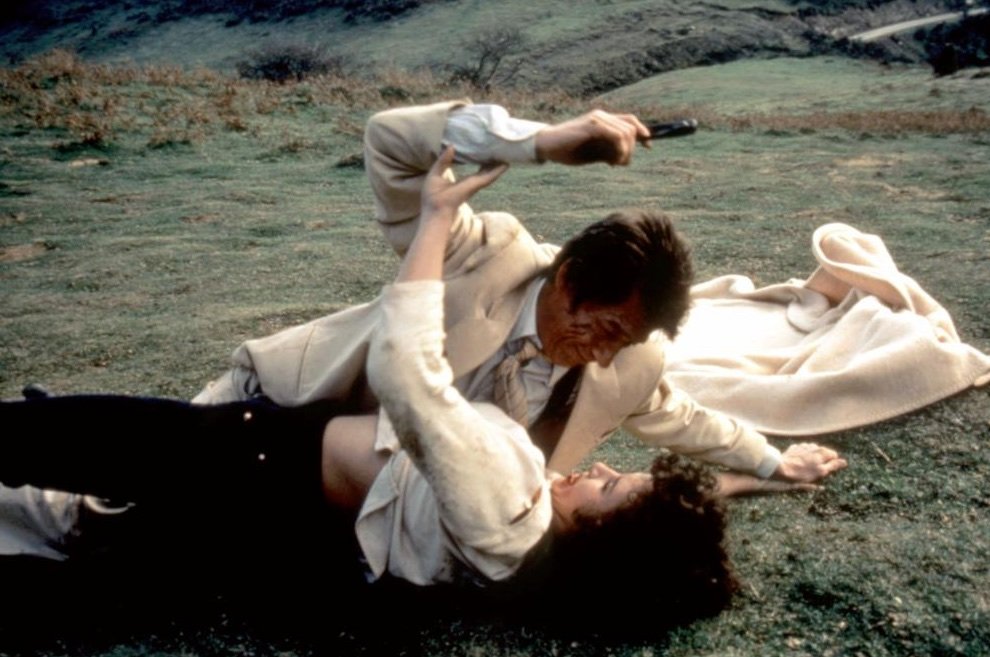
“Bring this guy some Pepto-Bismol!” a fellow diner yells as a choking, panic-stricken John Hurt collapses onto the table in the 1987 sci-fi spoof, Spaceballs.
Moments later an alien bursts through his midriff.
“Oh, no…” Hurt cries while looking down his body at its malevolent, twitching head. “Not again!”
His cameo is about the best thing in this very tired takeoff, but the fact Hurt’s original death was being parodied just eight years after Alien is a good indicator how firmly it caught the public imagination. Indeed, you’d be hard pressed to name a more memorable death in 20th Century cinema.

Hurt’s dead for real now, having enjoyed a much-lauded, eclectic, five-decade spanning career. He was a great British character actor, arguably at his best when portraying feeble, bottom rung of society types. The guy always appeared prematurely aged, looking like he’d been smoking thirty a day since learning to crawl. A typical role involved him getting wrongfully hanged, committing suicide, coping with bollock rot, taking a bullet in the back or being threatened with face-eating rats. He never had too much luck, you know? (Amazingly, and despite his numerous onscreen woes, I can’t recall ever seeing him throw a punch). This ability to play hapless victims was immeasurably helped by his prison pallor, scrawny body and general air of hopelessness.
In contrast, his voice was uncommonly rich, a distinctive, gravelly asset he put to cracking use in many animated flicks like the childhood-scarring Watership Down and The Plague Dogs.
I first became aware of his talent when he played the thick, boastful and ultimately doomed Timothy Evans (“Christie done it!”) in the superb 10 Rillington Place. Despite this early BAFTA-nominated success, it took him another seven years to really begin building momentum in the movie world but after Midnight Express he never looked back.

Midnight Express (1978)
“Have you ever been in a Turkish prison?” a pedo pilot asks a young boy in Airplane!
Well, I can safely say that even if you’re as gay as they come, it’s wiser to seek your jollies anywhere other than incarceration in Istanbul. Perhaps try watching gladiator movies instead.
Hurt plays Max in one of his most vivid portrayals of hopeless losers. By the time we meet him he’s already been lost in a world of shit for seven years. Addicted to heroin, he spends his days sucking on a dog-end while sticking a needle in an infected arm. With his unkempt tash, red-rimmed eyes, disintegrating hair, damaged glasses and cement-colored skin, he’s not so much at death’s door as halfway through it.
Still, at least he’s got a much-loved cat that he can cradle and whisper his troubles to.
Oh, hang on, no, he doesn’t. Someone’s just strung it up.
In truth, Hurt has little to do in this controversial flick except tell the tongue-severing main man Billy Hayes (Brad Davis) that Turkish lawyers are all bent and his only chance of getting out of such a hellhole is to catch the Midnight Express.
This is a key prison flick that (given its none too rosy presentation of the locals) definitely falls into the category of Movies That Wouldn’t Get Made Today. I don’t think there’s one even mildly sympathetic Turk in the whole shebang while Turkey itself is dismissed as a ‘nation of pigs’.
Naughty Mr Parker.
Hurt is thoroughly convincing, though, and I love the moment when the vicious prison chief pulls Hurt’s glasses off with one hand and crumples them as the primer for yet another beating.
No one can do abject terror like Hurt.

The Elephant Man (1980)
Things get off to a ropey start in this black and white Oscar winner when the feverish aftermath of John Merrick’s screaming mum being struck down by an elephant proves unintentionally funny.
Then we get a shot of Merrick’s savior Dr Frederick Treves (Anthony Hopkins) shedding a tear upon the first dismal sight of his future patient. I think we’re supposed to infer he’s a Compassionate Guy while the director beats us over the head with a mallet.
These minor stumbles are nothing to worry about, though. As soon as Treves takes Merrick under his wing, the flick settles into a reliable groove. “At no time have I met such a perverted and degraded version of a human being,” Treves tells his medical mates during a lecture at the London Hospital before listing the 21-year-old Merrick’s appalling physical defects. “As an interesting side note, and in spite of these aforementioned anomalies, the patient’s genitals remain entirely intact and unaffected.”
Guess that means he’s still in with a chance of a pity shag then.
Hurt is magnificent throughout, especially given that he does everything from beneath a thick layer of makeup. He makes great use of his eyes, as well as adding labored breathing and a swaying, faintly lascivious limp. Then there’s the way he’s able to communicate agitation, fear, decency and overwhelming gratitude simply by changing the pitch of his syrupy voice. Layer after layer of characterization is added including a surprisingly refined mind, a thirst for art, and even traces of vanity when he’s all dressed up and brushing his hair.
Every stage of Merrick’s life (stinking freak show star, mute hooded mystery, tea-pouring socialite and hobnobbing theatergoer) is movingly portrayed in a journey that captures the schizophrenic nature of cruelty and compassion inherent in human society.
The best scene arrives when he meets Treve’s wife for the first time in her genteel home and shows her a picture of his long-lost mother. “She had the face of an angel,” he says, pausing to look down. “I must have been a great disappointment to her.” Hurt’s delivery of such a tremendously understated, truly pathetic line is exquisite.
And, by the way, he’s not an animal.

Nineteen Eighty-Four (Er… 1984)
I was thirteen in the Year of Orwell when our English teacher Mr. Singleton decided it’d be a good idea to show the class this movie. No idea if he’d checked it out beforehand or just slipped it into the VCR on a can’t-be-bothered-to-teach-today whim, but I can still recall the loud titters, occasional pointing and embarrassed fidgeting.
Well, it does feature rat-covered corpses, public hangings, a haggard, reclining hooker pulling her skirt up her knickers-less thighs, and the frequently naked heroine sporting the hairiest beaver I’ve ever seen. Honestly, Suzanna Hamilton’s bush is like one of those early 70s afros I’m so fond of sniggering over in blaxploitation, except this one’s nestled between her legs rather than perched atop her head.
Anyhow, this fine movie depicts a superbly realized world of rusty razor blades, non-working elevators, grimy communal living, slops for food, soul-deadening employment, rampant gin consumption, dripping alleyways, constant surveillance, brain-drilling propaganda and the ever present threat of annihilation. The vast majority of it is so bleached of color and warmth that it might as well have been shot in black and white. There’s no chance of things getting any better, either, for as O’Brien (Richard Burton) tells Winston Smith (Hurt): “If you want a vision of the future, imagine a boot stamping on a human face forever.”
Crucially, it doesn’t repeat the central casting mistake of the underwhelming 1956 version. In that flick, Winston was played by a bloke who looked far too well-fed, as if his biggest problem was not the destruction of individuality that comes from living in an oppressive, war-torn society but which strawberry-topped dessert to scoff next. No such problem with that bony bastard Hurt, whom I feel was born to play such a malnourished loser. With his ashen face and hacking cough, he gives the constant impression he’s about to break into a shiver while any attempt to outrun the Thought Police would doubtless result in immediate collapse. He’s stuck in a prison every bit as real as Midnight Express’ Turkish shit pit, but unlike Max at least he gets some respite when he illegally hooks up with Hamilton’s aforementioned luxuriously carpeted lady part.
These simple scenes are vital in balancing the otherwise unrelenting bleakness. One day while lying in bed, he runs a trembling hand over the smooth curves of her body and muses: “Was there ever a time when this seemed ordinary?”
Of course, it can’t last and before long we’re knee-deep in another Hurt performance which underlines his willingness to embrace naked degradation. None too sprightly before his arrest, his shorn hair, rotting teeth and palpable air of misery make him look like he’s stumbled out of a concentration camp by the time the authorities have finished with him.
To a dead man, greetings.

Scandal (1989)
Friends are a strange old thing.
Without them, life is worth a great deal less and yet we can’t ever be sure of how strong these connections are until the pressure’s applied. Will they hold firm or crack?
Goodtime doctor Stephen Ward (Hurt) knows a great deal of people and is confident of their affections. “I like to think I’m loyal to my friends and my friends are loyal to me,” he says.
But as Michael Caton-Jones’ sublime period piece shows, it’s never that simple.
Hurt is on song here from the opening scene in which he derives genuine pleasure from watching a pretty girl ride a bicycle along the street in late 50s Britain. Then there’s the moment he takes an age to slip a ciggy into his mouth upon spotting the teenage Christine Keeler (Joanne Whalley-Kilmer) doing her act at a racy nightclub. He’s been struck by an Apollonian Thunderbolt, all right.
“I’m a very determined fellah,” he says before asking her to dance. “I’ll stop at nothing… when aroused.”
Within days he’s installed the showgirl in his London flat and is introducing her to his big shot Tory contacts. It’s clear he’s a libertine and a ‘connoisseur of sin’, a man who crucially stops short of being a pimp but still encourages her to attend swinging parties and sleep with those he calls his friends.
“Never say no to a dare, Christine,” he says. “You’ll never know what you might miss.”
She willingly complies, seduced by the curiously innocent charm of their platonic but genuine connection. “Trouble with this world is everyone’s afraid to enjoy themselves,” he tells her. “Or too ashamed to admit it.”
This is a smooth, confident man, at home in high society, and not the sort of Hurt I’ve grown used to. Surely he’s about to inject heroin or get ripped apart by an alien entity?

‘Fraid not, but his unnecessary fate, sparked by Christine banging a government minister and a suspected Soviet spy, is somehow sadder, especially given he’s not a malicious or violent man. Suddenly the police are calling him a ‘stinking little ponce’, the tabloids are hounding him, his patients have run for the hills, and even Christine, the girl he’s both corrupted and done so much for, can’t quite look him in the eye.
Someone has to take a thrashing. It’s just the way things are.
Bit by bit Scandal turns into a quietly compelling rumination on the nature of friendship and how it’s intertwined with such unstable elements as rumors, love, reputation, impropriety, dignity and the need for scapegoats, all sealed by the heartless actions of an ass-covering Establishment.
Hurt turns in an increasingly melancholy performance, a man who sinks under the wriggling actions of his society ‘friends’ and his increasing appreciation of human frailty.
“We all have something to hide,” he says at one point. “What a rum life it would be if we didn’t.”